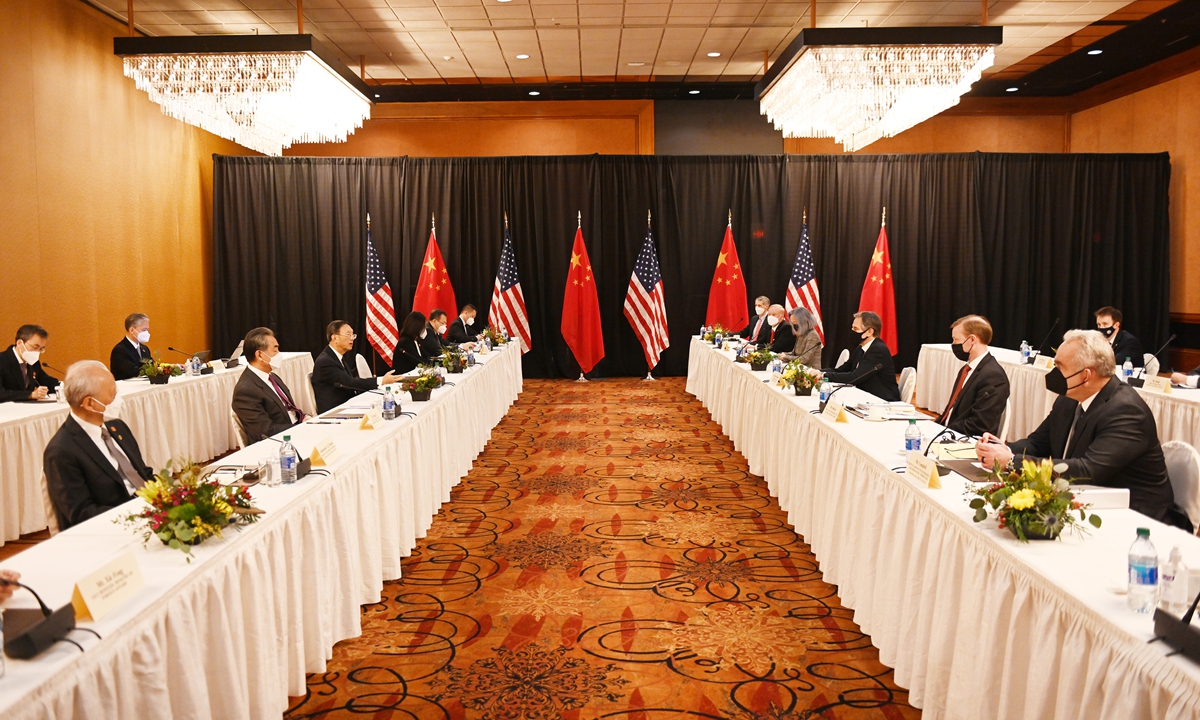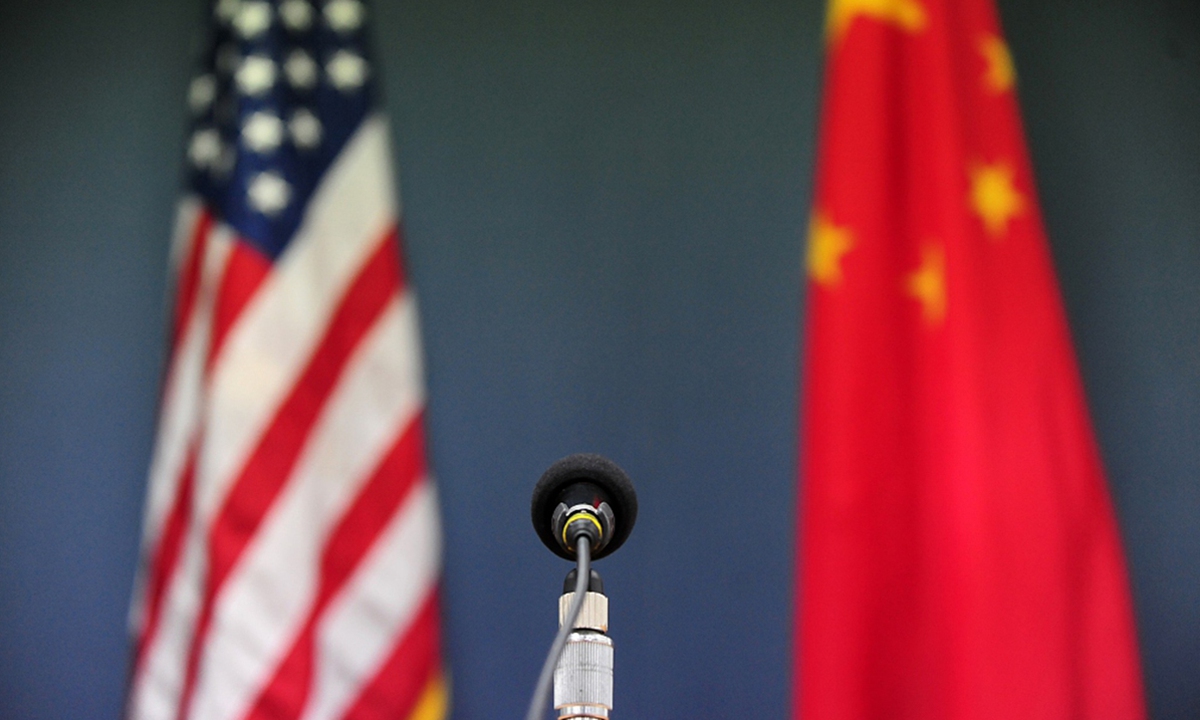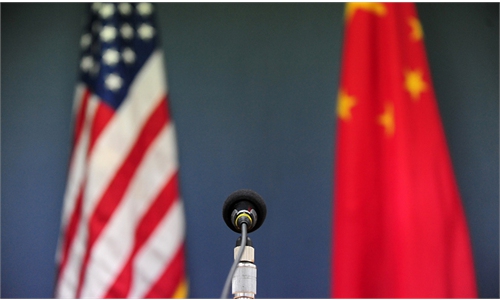Alaska talks a good beginning to amplify positive factors in China-US ties: expert

Chinese diplomats state China's position in the opening remarks of the China-US high-level strategic dialogue in Anchorage, Alaska, on Thursday local time. Photo: cnsphoto
Senior diplomats from China and the US wrapped up their first face-to-face meeting under the Biden administration over the weekend, such high-profile and candid dialogue, with tough exchanges, not only attracted global attention but also offered some clues for the tone of China-US relationship, with experts seeing specific issues on which the two countries will soon work on such as climate change, diplomatic facilities and staff as well as media personnel.
Meanwhile, a "candid, constructive and helpful" dialogue, described by both Chinese and US officials, hinted on major characteristics of the most important bilateral relationship today, which some Chinese scholars considered as keeping high-level communication, focusing on specific issues of common concern and amplifying common ground for cooperation to bring divergences under control.
An analysis from the Xinhua News Agency published on Saturday called the latest high-level meeting in Anchorage, Alaska, between senior officials of the two countries as timely, beneficial, candid, deep and constructive, it indicated that the two sides still have significant divergences on a number of issues. Despite this, the two sides hoped to maintain such high-level strategic communication to avoid misunderstandings and misjudgments. The article also laid out some specific issues that the two sides hoped to work on, including setting up a joint climate working group and conducting consultation on diplomats' activities and issue of journalists on basis of reciprocity.
China and the US have differences in many fields, but such differences only justify more effective exchanges and communication in the future, Chinese Ambassador to the US Cui Tiankai said in a tweet on Sunday, and the two countries can cooperate on the most demanding tasks such as climate change for the good of humanity, he noted.
What to begin with?
Beyond the tit-for-tat "war of words" at the Alaska meeting, experts also see possible areas for cooperation, among which on climate change, China and the US could reach a consensus the easiest, after the top leaders of the two countries have demonstrated their commitment to climate action respectively.
"Especially when the Biden administration has been correcting the deeds of its predecessor, such as the withdrawal from the Paris Agreement that led to severe consequences, China and the US will have much common ground on this aspect," Lü Xiang, a research fellow on US studies at the Chinese Academy of Social Sciences in Beijing, told the Global Times on Sunday.
Most recently, the Chinese government named a veteran official Xie Zhenhua, as China's special envoy on climate change, who has established contact, conducted dialogue as well as consultation with US climate envoy John Kerry, the Chinese Foreign Ministry said in late February.
Chinese Foreign Ministry said on Thursday a potential meeting between the two state leaders would not be on the agenda of the Alaska talks, yet some media speculated the first virtual meeting between them could be scheduled in April on the occasion of the international climate summit, the Chinese expert Lü believed communication between the two sides on this topic, including schedule of the two state leaders, would progress smoothly.
Also, consultation could be carried out on some other issues, including resuming people-to-people exchanges and facilitate the work of diplomatic and consular institutions and diplomatic personnel, and journalists-related issues based on reciprocity, according to the Xinhua analysis. In coming months, the two countries are expected to continue communicating with each other at a high level and work on specific matters step by step, Diao Daming, an associate professor at the Renmin University of China in Beijing, told the Global Times on Sunday.
"Rebuilding mutual trust, and restarting and expanding cooperation are now the most pressing issues," he said.
However, it still depends on what concrete action Washington will take in rebuilding this trust and restarting personnel exchanges that had been severely jeopardized by the Trump administration by ordering the shutdown of a Chinese consulate in the US, obstructing normal work of the Chinese media outlets in the US, imposing travel bans on the Communist Party of China (CPC) members and so on, bringing people-to-people exchanges to almost zero, according to Chinese scholars.
"As long as the US government corrects those misdeeds that undermined mutual respect and trust, the Chinese government will take corresponding measures in lifting restrictions. We also believe that there will be frequent ministerial-level communication on those issues," Lü said.

China US Photo: VCG
'No other choice' but collaboration
Although the tough rhetoric from senior Chinese diplomats appeared to be an unexpected gesture for their US counterparts at the Alaska meeting, former US and Chinese officials, scholars and business elites all called for more intensive efforts from Beijing and Washington to work together.
Former US Secretary of State Henry Kissinger told the China Development Forum via a video link that the US and China require both sides to make "ever more intensive efforts" to work together, media reported on Saturday. Modern technology, global communications and the global economy require the two societies to begin ever more intensive efforts to work together, because the peace and prosperity of the world depend on an understanding between the two societies, Kissinger said.
Fu Ying, former Chinese vice foreign minister, said at the forum over the weekend that the bilateral relationship had experienced a sharp plummet, and now it seems to be in a stalemate period, noting there are more favorable conditions for two countries to improve their ties compared to 50 years ago with a crucial factor being whether they could solve their reasonable concerns under the same international structure.
In other words, the situation speaks louder than people, which means as the world's two largest economies, only cooperation between China and the US can lay out fundamental stability for the international community, and there's no other choice, Lü noted.
"And using the so-called 'allied strategy' to pressure China would yield few results, as there are divergences between the US and its traditional allies, rendering a unified stance in the so-called Indo-Pacific to curb China unrealistic, or, we can call it a classic joke," he said.
While the US hopes that Japan and South Korea would become bigger bargaining chips in its alliance system in Asia to counter China, a palpable difference in addressing China in their statements issued after the 2+2 dialogue between senior diplomats of Japan-US and South Korea-US reflected that the so-called China threat has been downplayed in different countries.
"The Alaska meeting is a good beginning to amplify some positive factors that exist in China-US ties, which may help tackle some specific problems as the next step," Diao said.


